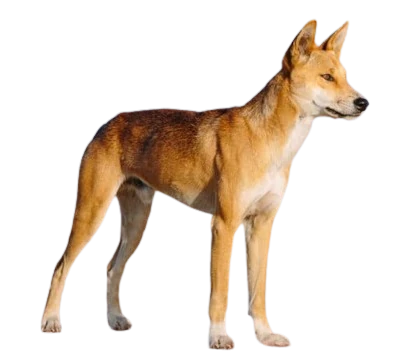Dingo: An Iconic Predator of Australia
The Dingo (Canis lupus dingo) is a wild dog emblematic of Australia. Known for its independence and crucial role in local ecosystems, it holds a unique place among canids.
Physical Description of the Dog
The Dingo is medium-sized, standing between 52 and 60 cm at the shoulder and weighing 13 to 20 kg. Its short coat is usually tawny-colored, sometimes with white markings on the legs, chest, and tail. Its upright ears and almond-shaped eyes give it an alert appearance.
Classification
The Dingo (Canis lupus dingo) belongs to the Canidae family.
- Kingdom: Animalia
- Phylum: Chordata
- Class: Mammalia
- Order: Carnivora
- Family: Canidae
- Genus: Canis
- Species: Canis lupus
- Subspecies: Canis lupus dingo
The Dingo shares characteristics with the Wolf and the Domestic Dog but is considered a distinct subspecies.
Habitat
Dingoes are found in diverse Australian environments, from arid deserts to tropical forests. They prefer remote areas and generally avoid densely populated regions.
Behavior and Social Life
Dingoes are opportunistic hunters, living in small family groups or sometimes alone. They communicate through varied vocalizations, including howls, and use scent marking to define their territory.
Diet
The Dingo's diet primarily consists of mammals such as kangaroos, wallabies, and rabbits. It can also feed on reptiles, birds, and fruits depending on available resources.
Conservation
Listed as a vulnerable species in some areas, the Dingo faces threats such as habitat loss, competition with feral dogs, and conflicts with livestock farmers. Conservation efforts aim to protect this iconic animal while mitigating its impact on agriculture.
Closest Genetic Cousins
The Dingo belongs to the genus Canis, which also includes the Gray Wolf (Canis lupus), the Golden Jackal (Canis aureus), and the Coyote (Canis latrans). These species share common characteristics, notably their complex social structure and their ability to hunt in packs.
-
The Gray Wolf is one of the closest genetic cousins of the Dingo. It is widespread in many regions of the world, including North America, Europe, and Asia. The Gray Wolf is known for its large size, thick fur, and ability to hunt large prey. This species plays a crucial role in ecosystems by regulating prey populations.
-
The Golden Jackal is a smaller species than the Gray Wolf, but it shares many genetic similarities with the Dingo. It is primarily found in Africa, Asia, and Southeastern Europe. The Golden Jackal is omnivorous and opportunistic, feeding on small mammals, birds, reptiles, and even fruits and vegetables.
-
The Coyote is another species closely related to the Dingo, native to North America. It is known for its adaptability and ability to survive in a variety of habitats, from deserts to forests. The Coyote is often considered a pest due to its interactions with human activities, but it also plays an important role in regulating small mammal populations.
Tips for Observers
To observe a Dingo in its natural habitat:
- Keep your distance: Use binoculars to watch them without disturbing them.
- Do not feed them: Feeding can disrupt their natural behavior.
- Learn more: Research protected areas where Dingoes are present.
By respecting their space, you contribute to their preservation.
The Dingo, a symbol of Australia, plays a key role in ecosystems. Understanding and protecting this animal is essential for ecological balance.
Wild Dog Breeds
© 2023 touslestoutous.com − All doggies. All rights reserved.
"The data available on this site may be used provided that the source is duly acknowledged."
